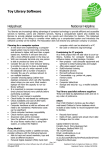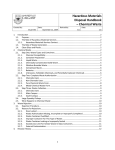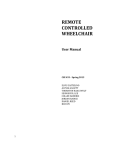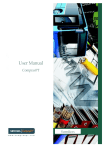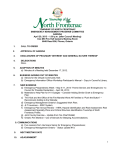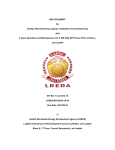Download Health and Safety policy - Polegate Town Council Website
Transcript
Polegate Town Council HEALTH & SAFETY POLICY Policy Number 15 Issue No. Date completed 1 23/02/2015 Details of amendments Adopted Jo Ognjanovic Updated 4th November 2014 \\POLEGATE1\My Documents\Policies\Policies in current use\POLICY 15 H&S Policy Feb 2015.doc Page 1 of 17 POLEGATE TOWN COUNCIL HEALTH AND SAFETY POLICY 1. General Statement of Policy 1.1 The Council’s policy is to provide and maintain safe and healthy working conditions, equipment and systems of work for all our employees, and to provide such information, instruction, training and supervision as they need for this purpose 1.2 The allocation of duties for safety matters and the particular arrangements which we will make to implement the policy is set out below 1.3 The policy will be kept up to date, particularly as the Council’s activities change in nature and size. To ensure this, the policy and how it is operated will be reviewed annually by the Personnel Committee. Although risk assessment is a continuing process, it shall form part of the Committee’s annual review 2. Responsibilities 2.1 The final responsibility for health and safety at work and compliance with Health and Safety Law and regulations and the Occupiers Liability Act rests with the Town Council. The Town Clerk is responsible for seeing that the policy is being carried out at all the Council’s premises. 2.2 The following staff members are responsible for safety in particular areas: 2.3 Staff Member responsibility Town Clerk Area Any special Council Office First aider Handy man Garage/Store and Pavilion, Wannock Road Skate Park, parks and children’s play areas All employees have the responsibility to co-operate with the Council and management to achieve a healthy and safe workplace and to take reasonable care of themselves and others When an employee or manager notices a health or safety problem which they are not able to put right they must advise the Town Clerk as soon as possible. Jo Ognjanovic Updated 4th November 2014 2.4 \\POLEGATE1\My Documents\Policies\Policies in current use\POLICY 15 H&S Policy Feb 2015.doc Page 2 of 17 2.5 Consultation between management and employees is by immediate day to day discussion with the Town Clerk 2.6 The Accident Record Book is kept in the Town Clerk’s Office 3. First Aid 3.1 First Aid Boxes are located as follows: Box 1: In the kitchen at 51 High Street Box 2: The Garage/Store at Wannock Road Box 3: In the pavilion At Wannock Road Box 4&5: In the kitchens at 49 High Street (2 boxes) Box 6: In the kitchen at Wannock office Box 7: In the litter picker’s car 3.2 Appointed persons responsible for boxes are as follows: Box 1 to 4: The Admin Assistant/Committee Clerk Town Clerk 4. Fire Safety 4.1 The Town Council will take advice on fire safety regulations from a registered fire protection company. 4.2 Fire extinguishers will be visually inspected monthly as follows: In the Council Offices by the Town Clerk In the garage/store and Pavilion by the handy man Fire extinguishers will be maintained annually by a registered fire protection company 4.3 Smoke detectors will be provided in all rooms and, where battery operated, the detectors will be checked weekly and the batteries will be changed once every 6 months. 4.3 The fire alarm system will at the Council Offices will be tested monthly by the Town Clerk. The fire alarm system will be maintained annually by the Council’s security alarm company. A fire drill will be held annually at the Council Offices and a record kept of lessons learnt. 4.4 Fire exits shall be kept free from obstructions 4.5 Notices shall be displayed giving directions for the evacuation of the building in the event of fire 5. Training Jo Ognjanovic Updated 4th November 2014 \\POLEGATE1\My Documents\Policies\Policies in current use\POLICY 15 H&S Policy Feb 2015.doc Page 3 of 17 5.1 The Town Council is responsible for ensuring that staff have adequate training. It is the Town Clerk’s responsibility to identify training needs of the staff 6. General Advice 6.1 General advice to all employees is attached as Annex 1 7. Specific Policies 7.1 Policies for particular premises and activities are attached as annexes as follows: 2. 3. 4. 5. 6. 7. Offices Grounds Maintenance Caretaking and cleaning Lifting and handling Lone Working Visual Display Equipment 8. Employment of Contractors 8.1 The notes to be given to contractors are attached as annex 8 9. Reporting and recording accidents 9.1 Accidents shall be reported to the Town Clerk who will record them in the Accident Record Book 10. Smoking 10.1 Smoking is not allowed in the any Council office or building belonging to the council. Jo Ognjanovic Updated 4th November 2014 \\POLEGATE1\My Documents\Policies\Policies in current use\POLICY 15 H&S Policy Feb 2015.doc Page 4 of 17 Annex 1 General Advice to Employees Your Rights • To work in places where all the risks to your health and safety are properly controlled • To stop working and leave the area if you think you are in danger • To inform the Town Council about health and safety issues or concerns • To contact the Health and Safety Executive or your Local Authority if you still have health and safety concerns without fear of disciplinary action by your employer • To join a trade union and to be a safety representative • To paid time off work for training if you are a safety representative • To take a rest break of at least 20 minutes if you work more than six hours at a stretch and to an annual period of paid leave Your responsibilities • To take care of your own health and safety and that of people who may be affected by what you do (or do not do) • To co-operate with others on health and safety, and not interfere with, or misuse, anything provided for your health, safety or welfare. The Council has a duty to inform you • About risks to your health and safety from current or proposed working practices • About things or changes that may harm or affect your health and safety • How to do your job safely • What is done to protect your health and safety • How to get first aid treatment • What to do in an emergency The Council must provide (free of charge) • Training to do your job safely • Protection for you at work when necessary (Personal Protective Equipment) • Health Checks if there is a danger of ill health because of your work • Regular health checks if you work nights and a check before you start The Council must also provide the following information • Health and safety law: what you should know. – This will give contact details of people who can help Jo Ognjanovic Updated 4th November 2014 \\POLEGATE1\My Documents\Policies\Policies in current use\POLICY 15 H&S Policy Feb 2015.doc Page 5 of 17 • • A copy of the Council’s health and safety policy statement An up-to-date Employers’ Liability (Compulsory Insurance) certificate visible in your place of work Annex 2 OFFICES 1. Heating Lighting and Ventilation 1.1 Temperature must reach a minimum of 60.8 degrees F (16 ˚C) after the first hour of working time. Local heating/cooling will be provided where a comfortable temperature cannot be maintained any other way. 1.2 Free standing heaters must not be used unless specifically authorised by the Clerk. When they are used they must comply with fire regulations and the area around them must be kept clear of paper or other flammable materials, and be sited away from desks and chairs. 1.3 Desks should be placed to gain the maximum amount of light. Free standing desk lights should be avoided or placed so as to minimise the danger of trailing electrical leads. 2. Electrical equipment 2.1 All electrical equipment shall be inspected in accordance with the 1989 Regulations. PAT Testing shall be carried out annually by a qualified person. 2.2 Mains must not be overloaded. It is important that the correct socket outlet and plug top (where these are available) is used for each item of electrical equipment. 2.3 Fused plugs must be used where at all possible. Fuses must be fitted to suit the current load of the equipment being used, and is normally shown in the user manual. Where manuals are not available the following is a guide to items commonly found within an office, and the fuse ratings required, e.g. desk lamp, calculator, telephone: 3 amp fuse; 2kw heater, electric kettle: 13 amp fuse. Fuses are available with ratings of 3, 5, 7, 10 and 13 amps. The current rating is normally shown on the item of equipment. If in doubt seek qualified advice. Only electrical equipment provided by the Council should be used and electric points must not be overloaded by the use of multi adaptors. All Jo Ognjanovic Updated 4th November 2014 2.4 \\POLEGATE1\My Documents\Policies\Policies in current use\POLICY 15 H&S Policy Feb 2015.doc Page 6 of 17 mains should be switched off when not in use and plug tops removed from sockets overnight and at weekends except where they are required to remain “on”. E.g. fax machines, heaters, telephones and copiers. 2.5 Leads from electrical equipment should not present a trip hazard by trailing across an access area. Extension leads should only be used as a temporary measure and should not exceed 10 feet in length. Where the use of an extension lead is unavoidable the lead is to be covered by a suitable rubber cable protector that conforms to the current British Standard. 2.6 Defective equipment should never be used. Staff must not attempt to effect repairs to electrical equipment unless they are competent to do so. 3. Furniture, Fittings and Equipment 3.1 Heavy equipment and furniture must not be moved by individuals 3.2 Office equipment whether manually or electrically operated must not be used by unauthorised, untrained personnel 3.3 Filing cabinets should always have sufficient weight in the bottom drawer to prevent the cabinet from tipping when a full top drawer is opened. Filing cabinet and desk drawers must always be closed immediately after use. Drawer filing cabinets should be inspected at least once every 6 months to ensure correct loading and smoothness of operation, with particular regard to the effectiveness of the drawer stops. Damaged or defective cabinets must not be used. A log of inspections shall be kept in the Town Clerk’s Office, together with any matters which require attention. 3.4 High shelves should only be reached with the use of steps or other equipment provided for the purpose. 4. Fire precautions 4.1 All staff must be fully conversant with the “Fire Alert” system displayed in the offices 4.2 Exit corridors, landings and stair cases must be kept clear at all times 4.3 Flammable materials must not be stored, even for a temporary period, in the offices or corridors, unless the storage is in a fire resistant structure such as a metal cupboard. 5. Floors and flooring Jo Ognjanovic Updated 4th November 2014 \\POLEGATE1\My Documents\Policies\Policies in current use\POLICY 15 H&S Policy Feb 2015.doc Page 7 of 17 5.1 All carpeted floors should be checked daily for trip hazards and a log kept of anything requiring attention. 5.2 All hard surface floor areas should be checked daily for slip hazards – e.g. wet patches formed through condensation or other means. Jo Ognjanovic Updated 4th November 2014 \\POLEGATE1\My Documents\Policies\Policies in current use\POLICY 15 H&S Policy Feb 2015.doc Page 8 of 17 Annex 3 Buildings and Grounds Maintenance 1. Only contractors or authorised members of staff, who have received training and instruction in the operation of machinery and equipment may do so 2. All dangerous moving parts of machinery must be guarded. Guards must not be removed except for the purpose of repair and maintenance. All machinery must comply with statutory regulations for guarding and use 3. The engines of any motorised item of equipment must be stopped before any inspection or adjustment is carried out. In the case of electrically operated machinery the plug must be disconnected 4. Children must not be allowed to play in an area where machinery is in use. Machinery must not be left unattended where children especially, or indeed any other persons, may interfere with it 5. Stones or similar objects must be cleared from the path of equipment to prevent such objects being projected from the machinery 6. Fuel tanks must only be filled in the open, with the engine turned off. No risk of naked flames, or smoking is allowed in the vicinity of a fuel tank or storage container 7. Fuel may only be stored in a safety can of an approved type, and stored in a fire resistant cupboard 8. The manufacturers’ instructions regarding the safe use of chemicals etc. must be adhered to. COSHH data sheets shall be obtained for all materials used (whether assumed to be a risk or not) read and understood by all personnel likely to use such materials, recorded in a log and a copy kept for reference in the Council’s garage/store 9. Appropriate personal protective equipment such as gloves, overalls, face masks, goggles, ear defenders and boots must be worn when operating machinery, when using chemicals including herbicides and pesticides, and when litter picking 10. Ladders and stepladders must be in good condition and free from defects and securely positioned at all times when in use. No work shall be carried on from a ladder above 2 metres high Jo Ognjanovic Updated 4th November 2014 \\POLEGATE1\My Documents\Policies\Policies in current use\POLICY 15 H&S Policy Feb 2015.doc Page 9 of 17 11. All pathways on Council owned property shall be inspected quarterly and a record kept. Any work found to be necessary for safety shall be reported to the Town Clerk 12. All gates, fences, signs and any other boundary markers shall be inspected half yearly Jo Ognjanovic Updated 4th November 2014 \\POLEGATE1\My Documents\Policies\Policies in current use\POLICY 15 H&S Policy Feb 2015.doc Page 10 of 17 Annex 4 Caretaking and Cleaning 1. The Caretaker/Cleaner is responsible for identifying the correct tools required to carry out the job in accordance with the job description 2. The Town Council is responsible for providing the correct tools to carry out the job 3. The Caretaker/Cleaner is responsible for ensuring that they have sufficient materials for carrying out the job. The Town Clerk/Administrative Assistant is responsible for supplying the requirements of the Caretaker/Cleaner 4. It is the Caretaker/Cleaner’s responsibility to read the labels of all materials used and to use them in accordance with the manufacturer’s instructions and to heed any health warning attached. Where it is available, the COSHH data sheet shall be obtained and shall be read and kept by the Caretaker/Cleaner. If something is not understood it is the Caretaker/Cleaner’s duty to get clarification by communicating with the Town Clerk. It is of paramount importance not to mix any cleaning agents or chemicals. 5. The Caretaker/Cleaner shall take all necessary precautions to avoid spills, trips or falls. Any wet area must be clearly marked so that no other person is unaware of the danger of slipping 6. The Caretaker/Cleaner must not move any heavy item on his/her own. For this reason no desk or cabinet may be moved for the purposes of cleaning unless an arrangement has been made for the safe moving of such furniture. Jo Ognjanovic Updated 4th November 2014 \\POLEGATE1\My Documents\Policies\Policies in current use\POLICY 15 H&S Policy Feb 2015.doc Page 11 of 17 Annex 5 Lifting and Handling General Statement Lifting and manual handling will be kept to the minimum required to carry out normal tasks. No employee will attempt to lift or carry any object, package or any other thing that is too heavy, or too awkward for them to lift alone. Where two or more persons are required to lift, or carry anything assistance must be sought. Training Employees who may be expected to carry out manual handling operations during their normal work will be provided with training. Assessments Activities of staff will be reviewed to assess the risks of manual handling. Identified risks Delivery of bulk supplies Suppliers will be required to deliver as close as possible to place where the supplies will be used or stored. The employee will transfer to store in loads suitable for his ability. Assistance must be sought where necessary. Movement of plant and machinery Plant and machinery which requires to be moved from place to place shall moved on wheels. Employees shall report to the Town Clerk if they need to move any item of plant or equipment without the necessary means to do so, so that the appropriate means may be obtained. Movement of materials The need to move materials (e.g. seed, fertilizer, liquids etc.) shall be kept to a minimum. Relevant Personal Protective Equipment must be used when moving such materials. No employee will move heavy materials (e.g. large paving slabs) without calling for assistance. Office furniture The movement of office furniture will be kept to a minimum The movement of tables is designated as a two person task Tables and Chairs shall be stored in stacks of reasonable size Tables and Chairs must not be stored in awkward storage areas Jo Ognjanovic Updated 4th November 2014 \\POLEGATE1\My Documents\Policies\Policies in current use\POLICY 15 H&S Policy Feb 2015.doc Page 12 of 17 Annex 6 Lone Working General Statement All of the Council’s employees work, at least part of the time, on their own. The Council has taken on board the advice given by the Health and Safety Executive for dealing with this issue. It is the Council’s responsibility to assess the risks involved and to take steps to avoid or control such risks. Employees and contractors have the responsibility to take reasonable care of themselves and other people affected by their work and to co-operate with the employer in meeting the legal obligations. Risk assessments will be carried out for all jobs undertaken by lone working. Policy 1. The Health and Safety Executive’s booklet on Working Alone in Safety will be issued to all staff to enable them to identify any risks that may need to be brought to the attention of the Council 2. A separate policy for call-outs for an activated alarm will be put in place to ensure the safety of the officer, or Councillor, called out to deal with the situation. 3. Office staff, the Handyman and the Litter Picker will be issued with a personal alarm. 4. Office staff will also be issued with a radio controlled panic alarm activator so that the alarm can be activated anywhere in the Council Office and outside in the car park. A panic alarm activator will be placed at the public counter. 5. All employees working alone must be able to be in contact with the Office at all times. This will be through radio or mobile ‘phone contact. Where an employee is prepared to use their own mobile ‘phone this will be the acceptable solution and the Town Council will reimburse the cost of calls made. If an employee is not prepared to use their own mobile ‘phone the Town Council will provide one for the duration of the employed person’s employment. In this case the ‘phone may not be used for making private ‘phone calls. 6. A lone worker shall not put themselves at risk, but report any incidents to the Town Clerk. If necessary the employee shall call the Police. If an employee calls the Police they must also inform the Town Clerk that they have done so and why. Jo Ognjanovic Updated 4th November 2014 \\POLEGATE1\My Documents\Policies\Policies in current use\POLICY 15 H&S Policy Feb 2015.doc Page 13 of 17 7. The Office Cleaner works outside of office hours and is alone. The Office cleaner will ensure that they are able to enter the building in safety and lock the front door behind them so that they are secure inside the building for the performance of their duties. If, on leaving the building, there is concern for their safety, they should remain in the building and call the Police. Jo Ognjanovic Updated 4th November 2014 \\POLEGATE1\My Documents\Policies\Policies in current use\POLICY 15 H&S Policy Feb 2015.doc Page 14 of 17 Annex 7 Visual Display Equipment General Statement It is the employer’s duty to comply with all statutory regulations regarding visual display equipment, i.e. computer monitors. The Town Council has a duty to analyse work stations and assess and reduce risks by carrying out risk assessments. They must look at the whole workstation including equipment, furniture and the working environment. They must also consider work being done by any employee with special needs, e.g. disability discrimination requirements. Policy 1. The employer should ensure that good features are in place, i.e. adjustable and safely balanced chairs and appropriate desks. Good lighting. A good working environment, adequate computer equipment and appropriate software. 2. Regular short breaks from working with the VDU should be made rather than fewer long breaks. The council recognises that this is not always possible, and whilst the employee should have a large measure of control over when breaks from the VDU are taken, the employee should attempt to organise their work so that they are able to have regular breaks away from the computer screen. 3. Training must be provided to ensure that employees are aware of the regulations and can use their equipment safely and avoid health problems. The information booklet provided by the Health and Safety Executive will be given to employees considered to be at risk. 4. Employees who use a VDU as a principal part of their work are entitled to have eyesight tests paid for by the Town Council, and in some cases spectacles should also be provided. 5. It is the employee’s responsibility to adjust equipment and seating to suit their own individual requirements 6. The chair and VDU should be adjusted so that, as a broad guide, forearms should be horizontal and eyes at the same height as the top of the VDU screen. There should be adequate space for documents to be managed on the top of the desk. A document holder will help prevent neck discomfort. Sunlight or artificial light should not be allowed to bounce back off the screen and there should be adequate space beneath the desk for the free movement of legs. Excess pressure on the back of the knees should be avoided and a footrest used where necessary. Jo Ognjanovic Updated 4th November 2014 \\POLEGATE1\My Documents\Policies\Policies in current use\POLICY 15 H&S Policy Feb 2015.doc Page 15 of 17 7. The keyboard and mouse should be adjusted to suit the user’s hand movements. A wrist rest in front of the keyboard will help alleviate strain and the possibility of repetitive strain injury (RSI). Use the most up to date mouse available. The preferred models are those without a roller ball and which have a central wheel for scrolling. Operators should not sit in the same position for long periods. Breaks away from the VDU should be taken regularly and should include light exercise. Jo Ognjanovic Updated 4th November 2014 \\POLEGATE1\My Documents\Policies\Policies in current use\POLICY 15 H&S Policy Feb 2015.doc Page 16 of 17 Annex 8 Information for Contractors General Contractors will be required to produce their own Health and Safety Policy and risk assessment(s) associated with the work they are contracted to carry out. Contractors must have public liability insurance cover of at least £5m. Electricians must be NICEIC registered. Contractors handling sanitary waste, clinical waste, herbicides, pesticides etc. must be appropriately licensed, and evidence produced to the Town Clerk. Records will be kept of all licenses seen. The work of all contractors will be monitored and records kept. Contractors are responsible for their own health and safety and working hours. However the Council will monitor the contract for compliance with health and safety policies, notified risk assessments and statutory regulations. Jo Ognjanovic Updated 4th November 2014 \\POLEGATE1\My Documents\Policies\Policies in current use\POLICY 15 H&S Policy Feb 2015.doc Page 17 of 17



















